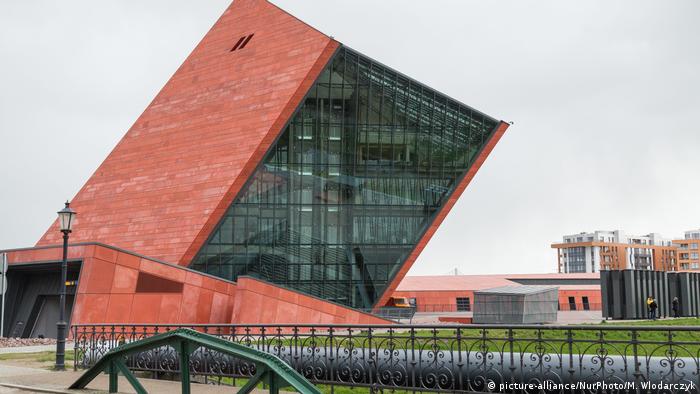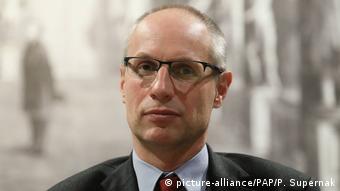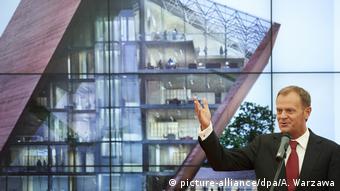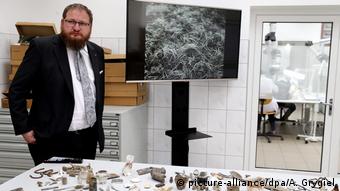A court in Gdansk has to decide whether the original Museum concept is subject to copyright. The conflict also reflects Poland’s struggle for sovereignty of interpretation over the history.

In the case of the 2017 opened the Museum of the Second world war in Gdansk makes the headlines. After a new Museum Board had made extensive changes to the original concept of Ex-Director Pawel Machcewicz and three of his employees, sued new line for copyright infringement. On Wednesday (10.10.2018) held the first hearing of the plaintiff. The defendants will at the 17. October be heard, a court decision is due at the earliest in the spring of 2019.
“No right to intervene”
Machcewicz and his colleagues are of the view that the changes would have destroyed the message of the Museum and the Museum of “” politicized. “We do not want financial reparation, because the exhibition is a part of General national Good. But the politicians have no right in exhibitions. This happened in communism, but in a democracy, the not,” the Ex-Director goes to the DW. He calls, therefore, that the exhibition concept is recognized as a whole and the Modifications made are unlikely to be illegal to be classified.

Pawel Machcewicz does not want to leave it to the Polish government without a fight in the field
The spokesman for the Museum, Aleksander Maslowski (the new leader, Karol Nawrocki, wanted to take no position), is surprised by the lawsuit “limitless”. It was “a curiosity that someone has created with public money, the property of the state brings a claim on copyright. If the court should acknowledge that, were all the museums in danger, because the respective management of the Museum is expected to make about 100 years, no Changes,” says Maslowski in an interview with DW.
International orientation is undesirable
New to the largest Museum project in Poland since 1989, was that the war not only from the Polish perspective, lights should be, but also the experience of other Eastern and Central Europeans, as well as the international Dimension of the war, a role should play.
The green light for this type of implementation, there were in 2007 by the then Polish Prime Minister Donald Tusk. The current national-conservative government party PiS (“law and justice”) but to tell the Museum concept from the beginning a thorn in the eye: “What is it? The suffering of the poles or the Germans?”, Jaroslaw Kaczynski, party leader of the PiS asked, in 2008, in the Polish Parliament, as the Museum still existed only on paper. On the party Congress in 2013, he announced, therefore, that the PiS will change the Museum after the seizure of power, “the exhibition brings the Polish perspective”. The Museum, with its international character is a “gift of Donald Tusk, Angela Merkel” that fits well in the “German politics of history,” reiterated Kaczynski in July, 2017 on the radio station “Radio Maryja”.

2007 green light for the Museum’s concept of Machcewicz: the then head of government Donald Tusk
As historian Pawel Machcewicz was allowed to open his life’s work in March 2017, but was dismissed after only two weeks as a founding Director and Karol Nawrocki replaced, started the exhibition in accordance with the ideas of the PiS remodel: The Museum of the Second world war to ensure the “preservation and dissemination of the national and state tradition”, and especially “to take into account the Polish history during the Second world war, including the defence war of 1939,” noted Minister of culture, Piotr Glinski in April 2016.
Systematic Transformation
To this end, several changes to the Show made: The number of Polish partisans was increased from 40,000 to several hundred thousand. According to Museum spokesman Aleksander Maslowski had been underestimated. One could speak of 40,000 active fighters, but the Polish military organizations in the subsoil would have had a lot more members and the support of the civilian population amounts to a million.
Also information about Poland, the saved Jews, has added the new management of the Museum, as well as a part of the suffering of Polish priests in the Dachau concentration camp.
A Film that deals with the horrors of the Second world war, and an admonition indicating that even today, in the world wars, has been replaced by “The Invincible”, a Film told in a pathetic manner by the Polish heroism in the war, and during the fall of communism.
“History in the Museum of world War I disfigured”
“We want nothing else, than that from the Polish point of view necessary to restore Balance,” explains Museum spokesman Maslowski. The exhibition should not be on Poland’s history in focus, otherwise, you know, “whose story here is told”. The responsibility for the war had been watered down from the predecessors””.
For Ex-Director Machcewicz, the changes to the concept, however, is clearly in contradiction to the idea of the exhibition, which was also intended as a warning against war. “It was the universal message of the Museum that people tend to lead to wars, and that we are surrounded by them. With this impression the visitor has left the Museum.” Now it is a place to meet but a national “self-praise” and a “primitive message”. Thus, the history of the world war, will disfigured Museum, Machcewicz, has also filed a lawsuit at the European court of human rights because of a restriction of the freedom of expression by the PiS government. If the lawsuit is upheld, is still open.
Where does Poland?

Also Piotr Cywinski, the Director of the Auschwitz Museum, needs to fear for his Post
The dispute over the Gdansk world war II Museum is not an isolated case. Is bitter in the PiS-ruled Poland to the interpretation of the story fought. So also the current head of the Auschwitz Museum, Piotr Cywinski not have to fear, is to lose his Post, because he is worthy in the eyes of the national conservative Polish war heroes and victims adequately. Already in 2015, the PiS called for his dismissal.
The historian Andrzej Friszke the Polish Academy of Sciences, has worked for 30 years with the recent history of Poland, speaks of a “cynical culture war”, the lines in today’s Poland, and to the division of the company contributions. “This fight is about much more than just the story. It’s about how the course for the future of Poland, Poland will still exist as a liberal democracy in the Western sense.”